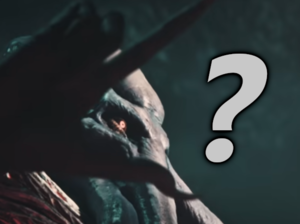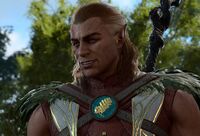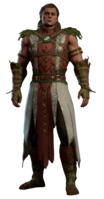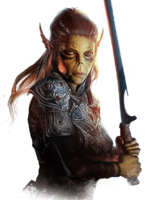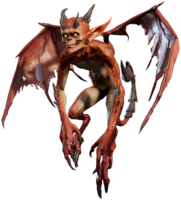Help:Style manual
This page serves as a basic style reference for contributors to bg3.wiki. Everything written here is intended as a guideline to be referenced when needed, not as an unbreakable rule.
General Wiki Guidance
- Contributors should write articles using straightforward, succinct language. Remember: less is more.
- Always (briefly) describe the nature of your edits by filling out the 'Summary' field on the submission page.
- Regarding disputes and disagreements: Always prioritise fixing factual errors over rewriting articles to conform to a specific style. Please avoid getting into edit wars. Take disagreements to the Discussion/Talk page or the bg3.wiki Discord.
Article Names
Guidelines for naming articles vary based on the type of article.
Concepts
When both singular and plural forms of a concept are viable, opt for the singular form. This enables easier linking while minimising the number of article redirects.
 Saving Throw (
Saving Throw ( Saving Throws)
Saving Throws)
- Link markup:
[[Saving Throw]]and[[Saving Throw]]sboth lead to Saving Throw, allowing for easy plural usage
- Link markup:
Exception: When a concept is frequently searched for or described as a plural, use the plural form instead. Additionally, create a redirect for the singular form. This enables easier linking of articles.
Characters
Opt for the character's simplest name, without any titles, aliases, or nicknames. Titles and aliases can be described in the text of the article itself. If a title or alias is very frequently used in-game, consider adding a redirect for it.
Firstname Lastname is also acceptable.
Items
Use the name of the item shown on the ingame tooltip, including the enchantment value, if any:
When an item has both an enchantment and a unique name, use the unique name without the enchantment value:
Locations
When a location has multiple names, opt for the name displayed on the minimap while standing in that location. Create redirects for alternative names.
 Ebonlake Grotto (
Ebonlake Grotto ( Myconid Colony)
Myconid Colony)
If a notable location does not have a minimap name, opt for the name of the nearest Waypoint or fold the location into a larger region or zone that encompasses that location (such as The Risen Road).
To determine what words to use when writing about a place, remember that the World (e.g. Faerun) is broken down into Regions(e.g. Wilderness) which may be composed of Zones(e.g. Druid Grove, Goblin Camp) and are all composed of, at the lowest scale, a location (e.g. Sacred Pool, Worg Pens).
Wiki Organisation
Various wiki organisation guidelines, plus generally agreed-upon word choices for organisational terms.
Chapters or Acts?
Follow the 'Chapter' nomenclature used by the quest journal, rather than the 'Act' nomenclature used in marketing materials. Additionally, spell out the chapter number as a word.
 Chapter One (
Chapter One ( Act 1)
Act 1)
Character Locations
When noting a character's location(s), try to list all permutations of where that character may appear. Group and sort multiple appearances for the same character by Chapter.
Exception: For the Characters infobox that appears at the bottom of named NPC pages (Template:CharactersNavbox), try to limit each character to only one location - whether that is the first location or the most common location for that character. For particularly significant characters who appear in multiple Chapters and/or multiple locations in the same Chapter, use your best judgment to determine whether it's appropriate to list multiple appearances for the same character.
Links
Frequency of Link Usage
Linking to other articles is an important part of wiki information discoverability, but inserting too many inline links can break the flow of text. A general guideline to follow when a term is mentioned several times in quick succession is to link the first instance of that term in each section of an article.
Linking Related Articles "Out of Context"
TBA
Formatting, Grammar, and Spelling
Abbreviations
TBA
Capitalisation
Follow Chicago Manual of Style guidelines for capitalisation of titles, item names, location names, game concepts, bg3wiki page names, page headings, and other proper nouns, even when in-game capitalisation differs.
 Circle of the Moon (
Circle of the Moon ( Circle Of The Moon)
Circle Of The Moon) The Festering Cove (
The Festering Cove ( the Festering Cove)
the Festering Cove)
In short:
- Capitalise nouns, pronouns, adjectives, verbs, and adverbs.
- Use lowercase for articles (a, an, the) and prepositions, except at the beginning of a proper noun clause
Punctuation and Grammar
Baldur's Gate 3 follows British English punctuation and grammatical rules (barring a few errors and inconsistencies). Aim to consistently employ these rules wiki-wide for consistency.
Quotes
 'Single quotes' (
'Single quotes' ( "Double quotes")
"Double quotes")
Commas
Use Oxford commas (also known as Serial Commas) when listing three or more items, unless directly quoting game text that omits this comma.
 Clerics, Rogues, and Barbarians (
Clerics, Rogues, and Barbarians ( Clerics, Rogues and Barbarians)
Clerics, Rogues and Barbarians)
Perspective and Objectivity
Write from a third-person, objective perspective. Ideally, omit the perspective entirely.
 This is item bugged in Patch 9. (
This is item bugged in Patch 9. ( We know this item is bugged in Patch 9.)
We know this item is bugged in Patch 9.) A Bard can use this to inspire allies. (
A Bard can use this to inspire allies. ( We can use this to inspire allies.)
We can use this to inspire allies.)
Second-person is also acceptable when the tone of a statement benefits from a more direct addressing of the reader, but try not to switch between third- and second-person perspectives too often.
 Your choice of reward does not matter here.
Your choice of reward does not matter here.
Never use first-person perspective in the main wiki namespace, even when making conjectures. If a statement is tentative and needs to be verified, that's okay - simply include the {{Verify}} template to let readers and other wiki editors know.
 This is also dropped by John Baldursgate.[Needs Verification] (
This is also dropped by John Baldursgate.[Needs Verification] ( I think this is also dropped by John Baldursgate.)
I think this is also dropped by John Baldursgate.)
Exception for Guides and Walkthroughs: When writing content for the Guide: namespace, feel free to write subjectively and from any perspective. This namespace is your place to interject your opinions and recommendations for players. Additional guidelines tailored for this namespace may be added at a later date.
Present Tense
Write in present tense, not past tense. bg3.wiki is first and foremost a 'snapshot' of the current version of BG3.
 Wyll is a Companion. (
Wyll is a Companion. ( Wyll was a Companion.)
Wyll was a Companion.) Mystra is the goddess of magic. (
Mystra is the goddess of magic. ( Mystra was the goddess of magic.)
Mystra was the goddess of magic.)
Exception: Past tense is acceptable when describing a notable change from a previous version of the game:
 Prior to Early Access Patch 9, this weapon was dropped by Zevlor.
Prior to Early Access Patch 9, this weapon was dropped by Zevlor.
Try to avoid slipping into future tense unless absolutely necessary.
 You regain 10 Hit Points. (
You regain 10 Hit Points. ( You will regain 10 Hit Points.)
You will regain 10 Hit Points.)
Pronouns
Mimic pronoun usage from in-game text, where available. Otherwise, maintain gender neutrality when a pronoun is called for, and use 'they/them' for both singular and plural cases.
 The Paladin can heal their allies. (
The Paladin can heal their allies. ( The Paladin can heal her allies.)
The Paladin can heal her allies.)
Spelling
Aim to consistently employ British spelling rules wiki-wide, particularly when copying text directly from the game, as with item, feature, and spell descriptions.
 Armour (
Armour ( Armor)
Armor) Defence (
Defence ( Defense)
Defense) Colour Spray (
Colour Spray ( Color Spray)
Color Spray)
Content Guidelines
Various guidelines to follow when adding content and information to the wiki.
'Where to Find' Sections
When describing where to find an item, include all of the following details:
- A description of the location of the item - or the source, if it's a quest reward or sold by a vendor
- Include both broad and specific information in this description, as needed (e.g. 'Found in Chapter One in the Underdark. The sword is near the Selûnite Outpost, embedded in a rock (X:116, Y:-192).')
- Instructions for any additional steps necessary to find or obtain the item (e.g. 'Jump up to the ledge behind the purple mushroom.')
- Map coordinates of the item, if applicable, in the format (X:123, Y:123)
When an item can be found in multiple places, list all known locations. Exception: For common and very plentiful items, don't worry about documenting every location via text. Instead, consider working with other wiki editors to generate a map of all locations or include a link to an external map resource.
Templates & Category Styles
Guidelines for templates and how to use them, and style consistency within page categories. For guidance on general template usage, see the Templates guide on How To Contribute.
Creating a New Page
When creating a new page, whenever possible, try and use a Page Creation Template.
Visually Indistinct Items or Effects
Some items are visually identical but have differing descriptions or statistics, in this case:
- If the only difference is a single value - description/price/weight etc. - using a single template and adding a bullet point for each differing value is recommended.
- If multiple values differ, creating multiple pages with disambiguation parentheses are recommended. i.e. 'Item (Ice)' & 'Item (Fire)'.
- If all else fails, having two entries on the same page is considered an acceptable temporary solution.
Images
Guidelines for image style, placement, and so on.
Image Size and Dimensions
- Both in terms of bytes, and dimensions, images should only need to be large enough* to be clear and presentable for their expected use.
- 720p is a good rule of thumb for the upper limit for image dimensions in most cases. Larger dimensions could be detrimental to the layout and readability of an article, particularly for mobile users and those with a low-end PC. The same goes for page loading times.
- Larger images may be justified in certain cases; For a dedicated map page, or screenshot gallery, for instance.
- * You could upload hundreds of 50 MB images... this is unlikely to meet with approval.
Image Naming
- This section is currently a WIP, and subject to change, though should still usable as a reference of guidelines to follow
Trying to keep consistency with uploaded image naming conventions is encouraged.
With thousands of images to reference, following this basic principle makes it a lot easier for other editors to find and reference images intuitively, and reduces the chances of multiple identical images being uploaded under different names.
All this in turn makes it less likely that pages will break, or show incorrect images if anything is changed. It also reduces the need for multiple pages to be manually edited when information needs to be updated, or new information is added.
Using your best judgement in this regard will usually mean you can stop reading this section for now. Read on for specific guidance and examples.
General Guidelines
If you are unsure, making a note of, and following any clear convention already present within file categories you may be adding to may also indicate best practices. If, in a specific scenario, you are uploading images, and there is no clear consensus, or the naming convention is unclear, the following are some general guidelines to reference:
- Preferred image format: If in doubt, .png is usually the preferred file type for images, or alternatively .jpg.
- Try and keep image names clear, but concise.
- Image names are also file names, avoid special characters, such as punctuation.
- An exception is that an underscore ( _ ) should_be_used instead of spaces between words.
Naming Style
The most basic image naming convention would be the image name, clearly but concisely describing what the image depicts. This may be followed by an indication of the image category, depending on the page category, or context it is likely to be used in.
Some objects and concepts in the game share names, and some have multiple image variations. If you are uploading multiple images that share a name, the use of a suffix after the image name but before the image category is highly recommended.
- By convention this is usually in the form of a single character*, ( 'A' 'B' 'C' etc. ), although there may be good reason to break from this convention depending on context.
- *The most important rule of thumb to follow in this scenario is that the image name stays consistent, followed by a unique suffix for each image sharing a name.
Category Names
As of writing, the only category name that is widely used is '_Icon', at the very end of an image name. This is still very useful for editors, as these icon images are used widely across different wiki pages, and are often representing an item or concept that may be used in vastly different contexts and have many different kinds of images sharing the same name.
Style and Syntax Examples
The most basic image naming convention would be the image name, clearly but concisely describing what the image depicts. In many cases, for specific types of image used in the wiki, there might be additional considerations when naming an image for upload.
- If you find yourself in a situation lacking a naming convention, and you think there should be one, start one; Most file naming conventions have evolved from other editors doing the same thing (as always, it never hurts to leave a comment somewhere too).
The following are some, often hypothetical, naming examples for reference, and not an exhaustive list:
- Shared Names and Multiple Images -
- Two different backpack icons:
- Backpack_A_Icon.png
- Backpack_B_Icon.png
- Screenshots* of the Underdark region:
- Underdark_Sussur_Tree.png
- Underdark_Mushrooms.png
- Underdark_Mush_Bibberbang.png
- Underdark_Arcane_Tower_NE.png
- Underdark_Arcane_Tower_S.png
- *By convention, screenshots have a more free-form naming style. This is probably due to their descriptive nature, and lower use per-image across multiple pages.
Character Images
For character pages, whenever possible, include both a cinematic portrait/screenshot and a 3D model of the character. Display the cinematic portrait first and ensure the PageSeo template has been invoked with the cinematic portrait as the image parameter. This will help ensure consistency across character pages and external link previews (e.g. social media sites and Discord).
Exception: When an official render or character art is available - as in the case of Origin characters such as Lae'zel - display that image first.
Exception: For common, non-named creatures, it is okay to display a 3D model first.
3D model for the common, non-named Lesser Imp
Image Placement
TBA
Item and Ability Icons
TBA
